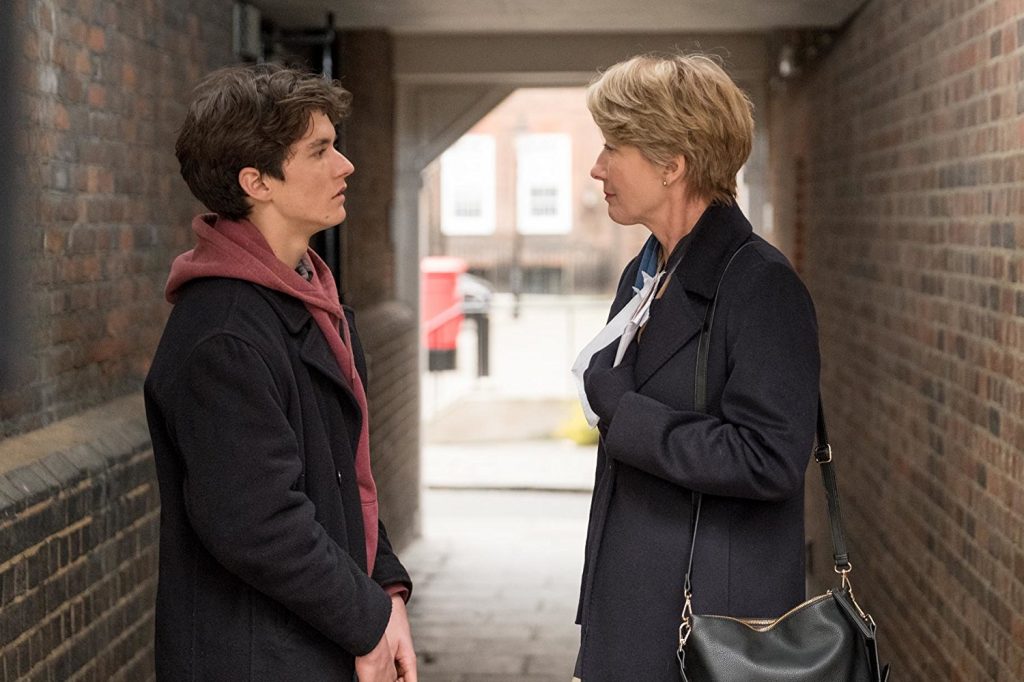Adapted by Ian McEwan from his acclaimed novel, based on the 1989 UK law of the same name, The Children Act asks the question: should the laws of a society, or the rules of a religion, take precedence? Set in London, around its central law courts, Emma Thompson plays Justice Fiona Maye, a High Court Judge who works on some of the most morally challenging cases, with literal life and death consequences; we are reminded of the real-life Charlie Gard, and Alfie Evans, and the public opposition those cases attracted. Early on, Fiona is tasked with rendering a ruling on the separation of conjoined twins, both of whom will die if not separated, but only one will survive if they’re parted. Faced with critical media coverage, and a heart-wrenching decision, Fiona still maintains calm as she issues her verdict; her ability to distance herself from emotion and issue a ruling show how clear-headed she is about these issues, and how seriously she takes her work in family law.
What’s at stake in The Children Act is whether Adam Henry (Fionn Whitehead), a 17-year-old Jehovah’s Witness suffering with leukaemia, should be forced to receive a blood transfusion that will likely save his life. Both he and his devout parents, Kevin and Naomi Henry (Ben Chaplin and Eileen Walsh), are fighting against this medical intervention, for religious grounds. Adam’s father Kevin makes an emotional plea on the stand and explains there is reason and logic in their faith, and in the decision they are making.
Fiona decides – with much break in convention – to visit Adam in his hospital bed, to get a better idea on his views of his religion and the treatment he’s declining. Somehow she ends up singing ’Down By The Salley Gardens’ with him as he plays guitar, forming a bond that is unprofessional and somewhat discomforting.
Meanwhile, Fiona’s husband Jack (Stanley Tucci) wants to embark on a sexual liaison with his colleague. Jack feels rejected and unwanted because he and Fiona have not had sex in a year; he repeatedly tries to talk with her about it, but her priorities lie with work, not in intimacy with him. He tells her he wants to have an affair – his disclosure makes it seem he wants her to fight for their relationship, rather than him pursue his desires elsewhere – but the emotional betrayal is too much for her and she locks him out of their apartment.
Fiona rules that Adam must receive the blood transfusion, arguing “We are ruled by law, not morals”, and he receives the treatment. As with all her cases, Fiona seems firm and sure of her verdict, but in her own private life she seems to be falling apart, and when Adam then repeatedly tries to make contact with her after he recovers, even to the point of following her, we see the mask she wears slowly begin to crack, and her emotions spill over the surface.
Thompson gives a storming performance and carries so much in the restraint she shows. Her face reflecting the pain and simmering fury deeply controlled, every line of dialogue carrying the weight of her feelings – or her attempt to hide them. The sheer multitude of expressions that Thompson shows are subtle pointers to Fiona’s emotions; though there are lots of court scenes and dialogue, Thompson has incredible skill in non-verbal communication. This is film acting at its best, and with Thompson in almost every scene, she gives a cerebral and emotional power to a film which could be bogged down in much legalese. Instead, Fiona is captivating, her stoicism pushed to the brink, and the emotional story has a powerful impact.
Tucci provides able support – and in a role often reserved for women, with love and shame the central focus of the character. He’s probably the warmest, most apologetic adulterer, and while he chose to hurt Fiona by his actions, his devotion and providing the emotional crutch she needs makes him more forgivable. Chaplin’s performance, also, is impressive – though sadly brief – and his powerful courtroom scene worthy of note. Whitehead’s naive tenderness and puppy-like devotion to Fiona are both disconcerting as well as heartbreaking, and his skill as a young actor makes this all the more remarkable. He’s able to command a strong presence onscreen, and alongside Thompson, and Richard Eyre’s direction focussing on such great performances, this makes for a compelling and enthralling human drama.
The Children Act is in cinemas fromFriday 24th of August.
